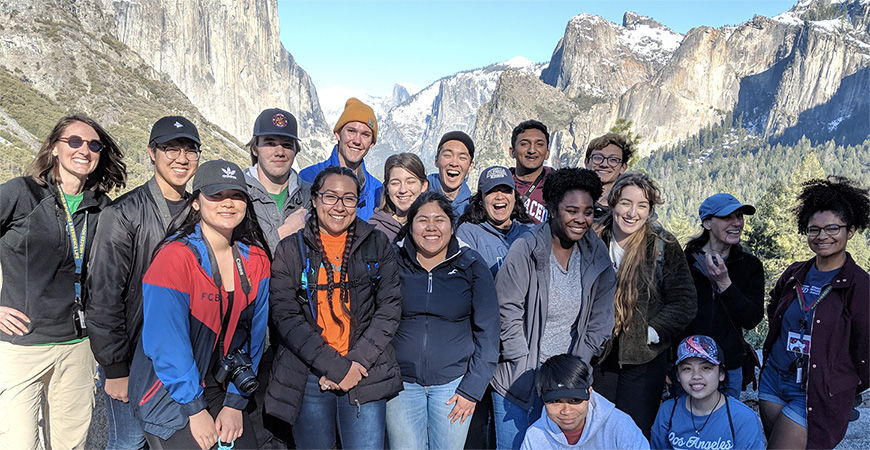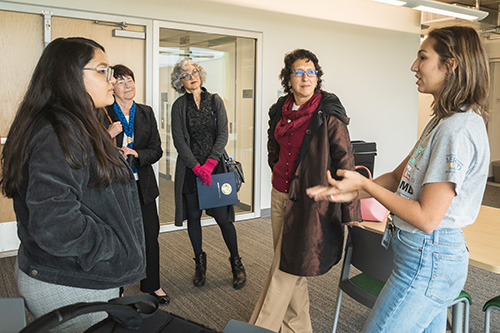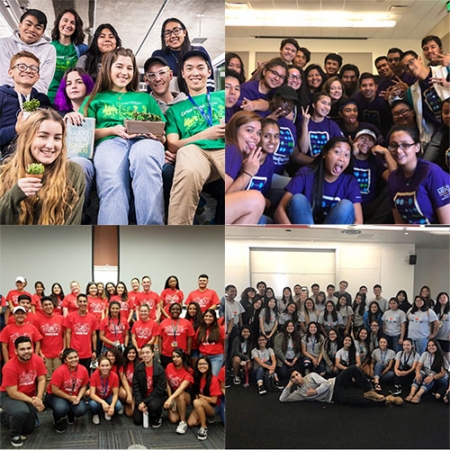
It started with a simple off-hand comment, one that would likely be met with a chuckle at any other institution. At UC Merced, it became a ripple that has changed the academic and social strata of an entire school.
School of Natural Sciences Dean Betsy Dumont recalled the exchange that took place shortly after she arrived on campus in August 2017. UC Merced’s director of Housing and Residence Life was deciphering how to fill rooms in Granite Pass and Glacier Point — the two new residential buildings that made up the fall 2018 delivery of the three-phase Merced 2020 Project.
Dumont suggested four floors for living learning communities — themed on-campus housing areas where students with similar interests live together and engage in programs tailored to the house theme. Living learning communities —LLCs — are linked to increasing retention rates because they help students who are adjusting to college life assemble networks of like-minded classmates and access resources and social interactions that ease their transitions.
The unexpected response Dumont received: “OK.”
“This opportunity is unprecedented. On campuses that have been there for decades, it would take years to go through the process of doing something like this,” Dumont said. “It’s fortunate that we had this opportunity and do something special for our students.”
Executing the ideas required close coordination with faculty and staff — including professors Rebecca Ryals, Michael Dawson, Chelsea Arnold, Erik Menke, Hrant Hratchian and Aaron Hernday — who helped construct syllabi and curriculum for the 240 first-year students who would be part of the inaugural LLCs inside Glacier Point in fall 2018.
Dumont said it meant a lot to her to see the faculty rally around this new idea because their role is integral to the program’s success.
“I was excited about the LLCs because I saw it as a way to give students a unique learning experience and a strong community,” Ryals said. “I was not skeptical because the research shows that LLCs and similar efforts are effective at retaining students. Engagement from faculty, staff, and Dean Dumont also signaled that the idea of LLCs had a lot of support.”

Unveiling the Houses
Themed communities for students are not new at UC Merced. From social justice to AFRO Hall and Fiat Lux Scholars, the Office of Residence Life and Education has provided opportunities to enhance student learning and retention through these housing options.
The School of Natural Sciences LLCs differ because they connect directly to students’ academic interests. Aristotle House, Beyond the M.D., Carson House and Vaughan House — the names of the four LLCs — feature students who work closely with resident house fellows — current UC Merced Ph.D. students who lead study sessions, field trips and house events and teach 1-unit seminars relating to their house’s specific topic.
Dumont said she has seen other universities employ a strategy where postgraduates serve as mentors to graduate students, but the faculty decided to scale it to help undergraduates.
Kinsey Brock, a fourth-year Quantitative and Systems Biology doctoral candidate, learned about the opportunity to serve as a fellow for Carson House just months before it started, and jumped at the chance to return to a themed community setting, which she enjoyed as an undergraduate at the University of Michigan. Brock served as lead instructor for Carson House’s weekly seminars introducing students to basic sustainability concepts.
“I had always hoped UC Merced would start something like the LLCs during my time here,” said Brock. “I think immersive experiences like the LLCs build intellectual community and friendships that help sustain undergraduates throughout their four years, and present transformative experiences for students that traditional classrooms just don’t provide.”
Aristotle House focuses on leadership, education and service in the natural sciences. Aristotle House scholars took a field trip to Yosemite Lake, which included collecting more than 50 pounds of trash in less than three hours. Students in this house build an association with CalTeach, which offers a minor that puts students halfway to earning a teaching credential.
Beyond the M.D. engages students interested in pursuing careers in health care to reflect on multiple pathways to their goals. Beyond the M.D. scholars visited UC Davis’ Pre-Health Conference, and enjoyed regular visits by alumni and other health professionals who discussed their career paths and experiences.
“This program really helped me open up and become a more social person, including having the courage to initiate conversation with others,” said first-year student and Beyond the M.D. Scholar Karina Gil. “The program also helped me realize the various health professions careers and encouraged me to not be so closed-minded toward pursuing a medical degree. Although I am still wanting to follow my career path as a general practitioner, this experience helped me realize the enjoyment and potential career path as a physician assistant.”
Carson House — a nod to conservationist and “Silent Spring” author Rachel Carson — explores sustainability through engagement with local and on-campus ventures related to food waste, energy efficiency and community education. Carson House scholars used an overnight retreat in Yosemite National Park to immerse themselves in ways to help alleviate concerns for the wellbeing of national parks.
“Carson House is the highlight and the backbone of my college experience,” said first-year student Austin John Escobar. “I came to college with a lot of heart and wonder, and Carson House nurtured that.”
Vaughan House — named after mathematician Dorothy Vaughan — provides students with opportunities to learn how to use computers to code and solve problems in math and science. Vaughan House scholars learned the basics of Python and engaged with faculty members who use computer simulations for their research.

'The students are over the moon about it'
Hui-Ling Chan helped develop more than 40 learning communities during her time at The Ohio State University and served as a consultant on living learning communities across the country. She said her first task after arriving on campus in February 2018 was to ensure the four houses could meet principles that studies have shown make LLCs effective for retaining students.
“Successful LLCs have these three criteria: measurable learning outcomes; strong partnerships between academic affairs and student affairs; and an integration of learning, living and learning, or, in other words, experiential learning opportunities,” Chan said.
Ryals added, “I think the LLCs foster a strong, supportive peer community. The transition to college can be a vulnerable and anxious time for many students. Students may have to navigate challenging coursework, a job, a new social environment, distance from family and other obstacles. At the very least, I think LLCs help students feel less overwhelmed in that transition.”
Though the arrangements came together in less than a year, the response to the first year of the LLCs has been overwhelmingly positive, Dumont said.
“The house fellows love it. The students are over the moon about it,” Dumont said. “We have nailed the social bonding part, but we still need to know what attendance is like at help sessions and how students are doing in classes.”
Dumont said faculty and staff will use the summer to examine data for potential program tweaks. One important aspect of the LLCs that will likely remain as the concept develops over the coming years is bringing tutors to the weekly house study sessions instead of encouraging the students to seek help on their own, which can be intimidating.
Gil said she arrived on campus nervous that she would need to be independent and reserved in order to succeed academically. But the Fresno native quickly evolved into an ambassador for the Beyond the M.D. house and learned she is not alone in her quest to find success at UC Merced.
“This program really helped me find comfort, as I was able to build a great group of friends and succeed academically,” Gil said. “It’s about finding a community where you can be yourself, surrounded by a group of students with similar interests but sometimes different majors, who can support one another emotionally and even academically. It’s a program where you can live and find a chance to grow as a person and learn to expand your mindsets in interests of career paths or opening up to others.”
Just as the LLC experience has resonated with the students — many are the first in their families to pursue higher education — the bonds formed in each house extend to the fellows and faculty involved, too.
“It brought me a lot of joy watching them tutor each other in subjects they excelled at in study hours. Many of them became best friends and travelled in packs around campus and joined clubs together,” Brock said. “The whole thing was really special to witness.
“The students were my community, too. When I walked home from lab at night, I’d often catch them at dinner and we’d share a meal together. A highlight of my day was seeing them wave to me from their study lounge on my bike ride home. We all became quite close and I think they supported me just as much as I supported them.”



